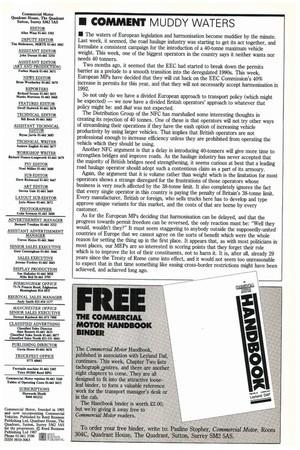• COMMENT MUDDY WATERS
Page 5

If you've noticed an error in this article please click here to report it so we can fix it.
• The waters of European legislation and harmonisation become muddier by the minute. Last week, it seemed, the road haulage industry was starting to get its act together, and formulate a consistent campaign for the introduction of a 40-tonne maximum vehicle weight. This week, one of the biggest operators in the country says it neither wants nor needs 40 tonners.
Two months ago, it seemed that the EEC had started to break down the permits barrier as a prelude to a smooth transition into the deregulated 1990s. This week, European MPs have decided that they will cut back on the EEC Commission's 40% increase in permits for this year, and that they will not necessarily accept harmonisation in 1992.
So not only do we have a divided European approach to transport policy (which might be expected) — we now have a divided British operators' approach to whatever that policy might be: and that was not expected.
The Distribution Group of the NFC has marshalled some interesting thoughts in creating its rejection of 40 tonnes. One of these is that operators will not try other ways of streamlining their operations if they have the eash option of increasing vehicle productivity by using larger vehicles. That implies that British operators are not professional enough to increase efficiency unless they are prohibited from operating the vehicls which they should be using.
Another NFC argument is that a delay in introducing 40-tonners will give more time to strengthen bridges and improve roads. As the haulage industry has never accepted that the majority of British bridges need strengthening, it seems curious at best that a leading road haulage operator should adopt such a contentious claim as a part of its armoury.
Again, the argument that it is volume rather than weight which is the limitation for most operators shows a strange disregard for the frustrations of those operators whose business is very much affected by the 38-tonne limit. It also completely ignores the fact that every single operator in this country is paying the penalty of Britain's 38-tonne limit. Every manufacturer, British or foreign, who sells trucks here has to develop and type approve unique variants for this market, and the costs of that are borne by every customer.
As for the European MPs deciding that harmonisation can be delayed, and that the progress towards permit freedom can be reversed, the only reaction must be: "Well they would, wouldn't they?" It must seem staggering to anybody outside the supposedly-united countries of Europe that we cannot agree on the sorts of benefit which were the whole reason for setting the thing up in the first place. It appears that, as with most politicians in most places, our MEPs are so interested in scoring points that they forget their role which is to improve the lot of their constituents, not to harm it. It is, after all, already 29 years since the Treaty of Rome came into effect, and it would not seem too unreasonable to expect that in that time something like easing cross-border restrictions might have been achieved, and achieved long ago.




































































































































